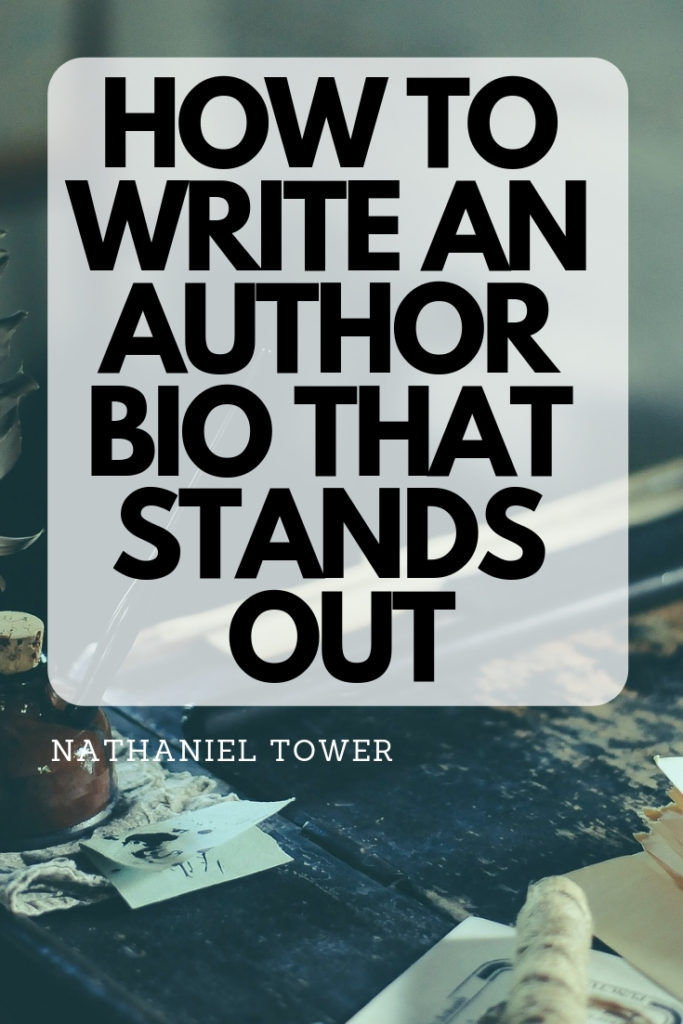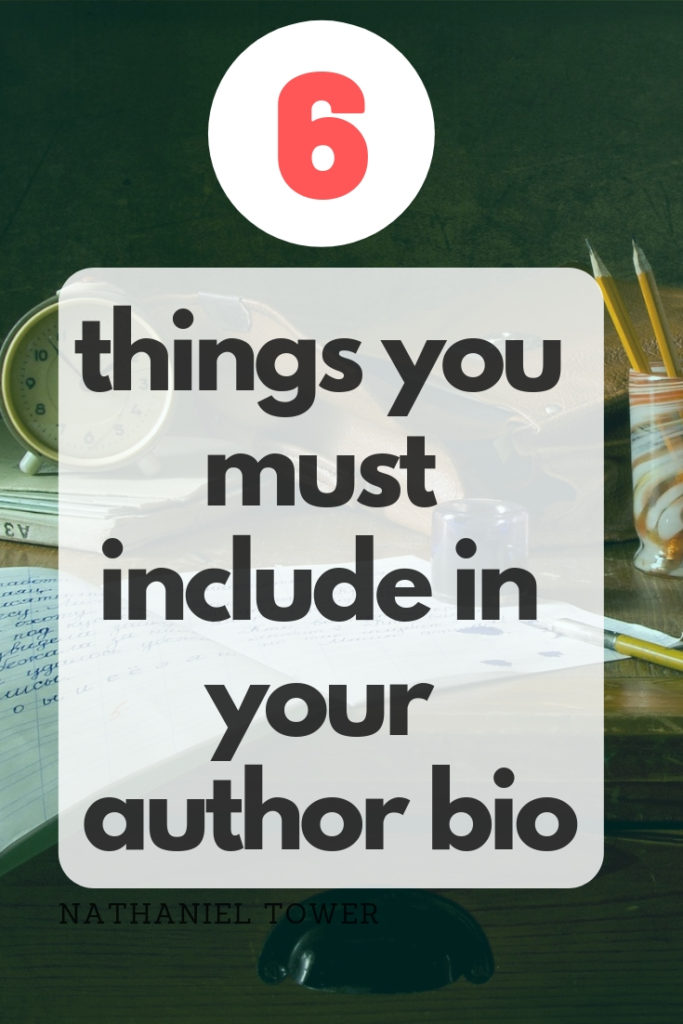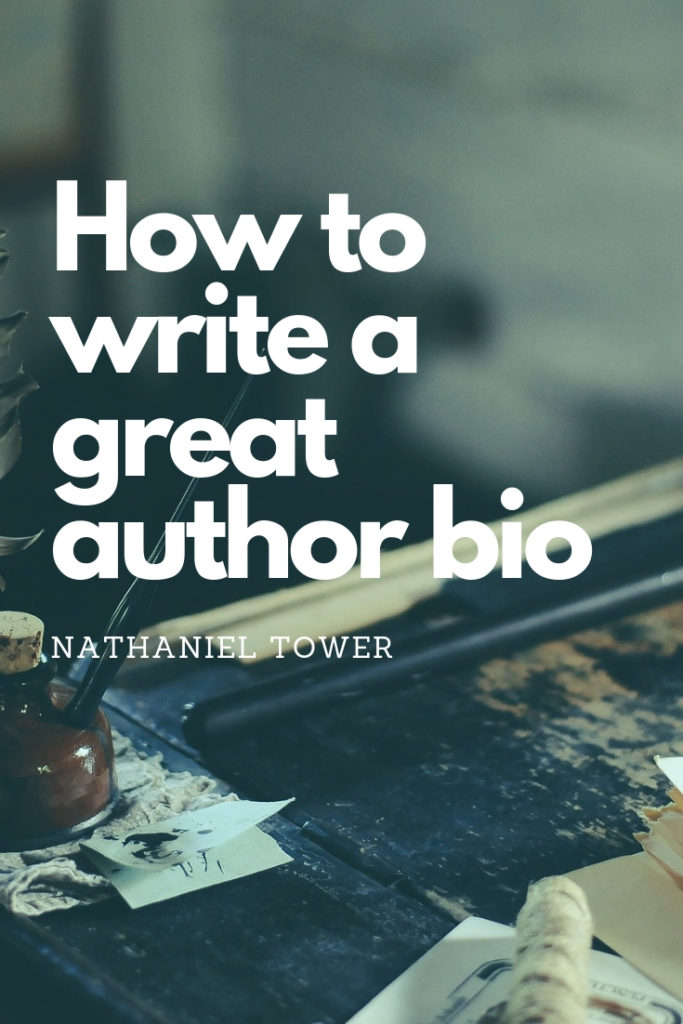Last Updated on May 25, 2020 by Nathaniel Tower
The author bio is a highly important part of being published, right? Well, yes and no.
Yes because you usually need one, and you should make it good because anyone who reads your story will presumably see it.
On the other hand, the author bio almost never has any bearing on whether or not you get published. So in that regard, it’s not important at all. But before we dive too far into that, let’s go over exactly what you should include in your author bio.
How to write your author bio
An author bio isn’t a complicated or elusive thing. It’s not something you need to rack your brain about for weeks or days or even hours. It doesn’t need to be super creative or catchy. It just needs to serve its purpose: to tell people who you are and how they can find out more about you.
It’s typically advised to keep your author bio short. Some publications will set the length for you (50 words or less seems to be the most common). If there are no maximum word counts, then I would recommend you keep it to under 100. If you get much longer, then readers will tend to gloss over it.
Here are the elements your author bio should typically include:
- A brief note about who you are, which could include where you’re from or what your day job is.
- A mention of any awards, contests, or honors you’ve won. Stick to major accolades here. You don’t need to mention that you were a Pushcart nominee, but you should definitely mention if you were a Pushcart finalist.
- A short list of your published novels or collections.
- A very brief list of any other publications where your work has appeared. Keep it to only 3 or 4 venues and always focus on your best publication credits. If you’ve never been published before, then you can skip this.
- A link to your website and/or social media profiles.
- Optional: a fun fact about you. If you do include this, make sure it’s something that’s actually fun.
That’s it. You don’t have to be cute or clever or funny. Pretty easy, right? Of course, that doesn’t mean you can’t have some personality in your bio. Just use your discretion and don’t overdo it.
Depending on how successful you are as a writer, you may not be able to include everything in your bio. It’s important to be selective. On the flip side, if you’re a new writer, you may need to pad your bio a little with stuff about your non-writing life.
Ask yourself this: What does my reader need to know about me to make them want to read more of my work? Ultimately, the story they’ve just read should make them want to learn more about you. Your bio is just a glimpse, not a life story. Make it informative so they know where to find you and your work. That’s really all there is to it.
Don’t over complicate things. If you can write a story that’s good enough to be published, creating an author bio should be a walk in the park.
How to write an author bio with no experience
If you’ve never been published before, you might think you have nothing to include in an author bio. You might also be worried this will impact your chances of publication. In most cases (as we’ll explore in just a minute), your author bio has no bearing on whether or not your work is selected for publication. But that doesn’t mean you shouldn’t have one prepared. It’s always better to have an author bio with no experience than it is to have no bio at all.
If you have no experience, here’s what you should include in your author bio:
- A brief note about who you are and where you are from.
- A statement about your professional experience. If you are in school, be sure to state this fact.
- A fun fact about your life. This could be a hobby, a major accomplishment, or something else that shows your personality.
- A link to your website or social media profiles.
Even with no professional writing experience, you’ll still have a 3-4 sentence bio if you follow this format. In most cases, this is plenty long for an author bio.
Bonus tip: If you are asked to provide an author bio after the acceptance of your first publication, then end your bio with a short sentence that clearly indicates this is your first publication.
Author Bio Template
Still not sure how to write an author bio? Try using this template to get started:
FULL NAME is a writer and OTHER PROFESSION from LOCATION. His/her work has been published in UP TO FIVE EXAMPLES. When not writing, he/she enjoys INTERESTING HOBBY HERE.
Here’s how it would look:
Nathaniel Tower is a writer and marketing executive from Minnesota. His short fiction has appeared in over 250 publications, including The Doctor T. J. Eckleburg Review, Bourbon Penn, and Drabblecast. When he’s not writing, Nathaniel can be found running through the woods, sometimes while juggling.
Most of the time, that’s all you need. If a publication wants you to create something longer or more specific, they will ask for it.
Why your author bio doesn’t really matter before publication
The vast majority of editors and publishers don’t even read your author bio until after they’ve made the decision whether to accept or reject your story. The content of your submission should do all the talking. While some publications require an author bio as part of their guidelines, they are typically only doing this to save themselves the hassle of asking you for one later if they do choose to publish your work. Very few publications use an author bio as a factor when selecting the works they are going to publish, and the ones that do should generally be avoided because they don’t care about the quality of the work so much as they do about the credentials of the writer.
How a good author bio helps after publication
Almost every story that appears on a lit mag’s website ends with an author bio. It’s the last thing the reader sees. It’s a gateway to your other work. It could make the reader want to connect with you. Sometimes it even leads to other publishing opportunities. For example, if the reader also happens to be a publisher, they may use your author bio to find you online and solicit more of your work. Therefore, it’s important to get the author bio right. Luckily, it’s pretty darn easy.
In summary, the author bio is only important post-acceptance. So if you’re holding off on submitting your work because you’re trying to nail down the perfect bio, then you’re focusing on the wrong things. Instead, you should focus on perfecting your story and creating a rock-solid submission strategy that will almost always lead to an acceptance.
What does your author bio look like? Do you stress over what to include in your bio? Share your thoughts in the comments.
How to write an author bio FAQs
Do I need an author bio?
If you want to have your work published, you need to have an author bio. Some publications will require you to submit an author bio along with your manuscript for consideration. Other publications will ask for your bio after acceptance but before publication. Regardless, you'll eventually need an author bio before your work is published. It's best to write your bio before you submit your work.
How long should my author bio be?
It's best to keep your author bio relatively short. You want to show who you are without overwhelming the reader. It's a good idea to list your top credentials, but don't go overboard talking about everything you've ever written. A short paragraph or two is typically enough. Some publications will give you a maximum word count for your bio.
What if I don't have an author bio?
If you don't have an author bio, you should create one before you submit your writing or try to sell your writing services. Having an author bio adds legitimacy to your status as a writer.
Should I list all my awards and publications in my author bio?
It's common practice to list some awards and publications in an author bio, but don't overdo it. Only list your top credentials. Many people wonder whether or not they should list a Pushcart Prize nomination in their author bio. Because these nominations are so common these days, it's not necessary to put this in your author bio. However, if you are a finalist, you should definitely list that.





I’ve been unclear about what constitutes important information to share on a bio, and I have erred on the side of including perhaps more than I should. I will give these suggestions a shot…